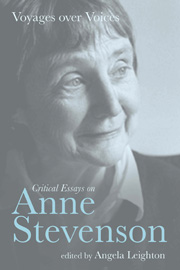Book contents
- Frontmatter
- Contents
- Notes on Contributors
- Acknowledgements
- ‘Making Poetry’
- 1 ‘Voyages over voices’: Introduction
- 2 The Melting Metaphor
- 3 ‘Between us’: Letters and Poems of Stevenson and Bishop
- 4 Mothers, Mirrors, Doubles: Anne Stevenson's Elegies for Sylvia Plath
- 5 Staging Second Thoughts: The Poetry of Anne Stevenson
- 6 ‘Making Poetry’: The Exemplary Anne Stevenson
- 7 ‘A curved adventure’: Romanticism and the Poetry of Anne Stevenson
- 8 The Nature of Anne Stevenson
- 9 Anne Stevenson and the Poetry of Place
- 10 Compacting Time: Anne Stevenson's Poems of Memory
- 11 ‘Not exactly a persona’: Pronouns in Anne Stevenson's Poetry
- 12 ‘To serve a girl on terrible terms’: Anne Stevenson's Writing Selves
- 13 Talking and Singing: Anne Stevenson's Variations on a Rhythmical Theme
- 14 ‘Time will erase’: Anne Stevenson and Elegy
- 15 Observing the Overhearing: The Anne Stevenson Papers in Cambridge University Library
- 16 Bibliography of Anne Stevenson's Published Works
- General Index
- Index of Stevenson's Works
1 - ‘Voyages over voices’: Introduction
- Frontmatter
- Contents
- Notes on Contributors
- Acknowledgements
- ‘Making Poetry’
- 1 ‘Voyages over voices’: Introduction
- 2 The Melting Metaphor
- 3 ‘Between us’: Letters and Poems of Stevenson and Bishop
- 4 Mothers, Mirrors, Doubles: Anne Stevenson's Elegies for Sylvia Plath
- 5 Staging Second Thoughts: The Poetry of Anne Stevenson
- 6 ‘Making Poetry’: The Exemplary Anne Stevenson
- 7 ‘A curved adventure’: Romanticism and the Poetry of Anne Stevenson
- 8 The Nature of Anne Stevenson
- 9 Anne Stevenson and the Poetry of Place
- 10 Compacting Time: Anne Stevenson's Poems of Memory
- 11 ‘Not exactly a persona’: Pronouns in Anne Stevenson's Poetry
- 12 ‘To serve a girl on terrible terms’: Anne Stevenson's Writing Selves
- 13 Talking and Singing: Anne Stevenson's Variations on a Rhythmical Theme
- 14 ‘Time will erase’: Anne Stevenson and Elegy
- 15 Observing the Overhearing: The Anne Stevenson Papers in Cambridge University Library
- 16 Bibliography of Anne Stevenson's Published Works
- General Index
- Index of Stevenson's Works
Summary
Some twenty-five years ago, as a young lecturer at the University of Hull, I was invited late one cold, winter afternoon to attend a poetry reading. For some reason the organisers, Oxford University Press, had failed to alert anyone to the occasion, and I was part of a last-minute whip-round for an audience. In the event there were just three of us sitting in an empty back room in the student union, trying not to look so uncomfortably few. I shall never forget, however, listening to a fiery, diminutive woman reading her poems, one of which in particular made the hairs prick at the back of my neck and brought tears to my eyes. The poem was ‘Willow Song’, and the poet was Anne Stevenson.
When, many years later, Liverpool University Press asked if I might like to edit a collection of essays on a contemporary poet, in a series which already included Paul Muldoon and Roy Fisher, it did not take me long to decide on Anne Stevenson – a poet who has published more than eighteen volumes of poetry as well as several works of criticism, and who has been the recipient of honours and awards on both sides of the Atlantic. Now in her seventies, Stevenson, like many poets writing during the last forty or fifty years, has of course been in and out of critical fashion. Herself a feisty and forthright critic of many of those fashions, she has nevertheless remained true, through times of favour and disfavour, to her own voice and her own sense of what constitutes poetry.
- Type
- Chapter
- Information
- Voyages over VoicesCritical Essays on Anne Stevenson, pp. 3 - 13Publisher: Liverpool University PressPrint publication year: 2010

